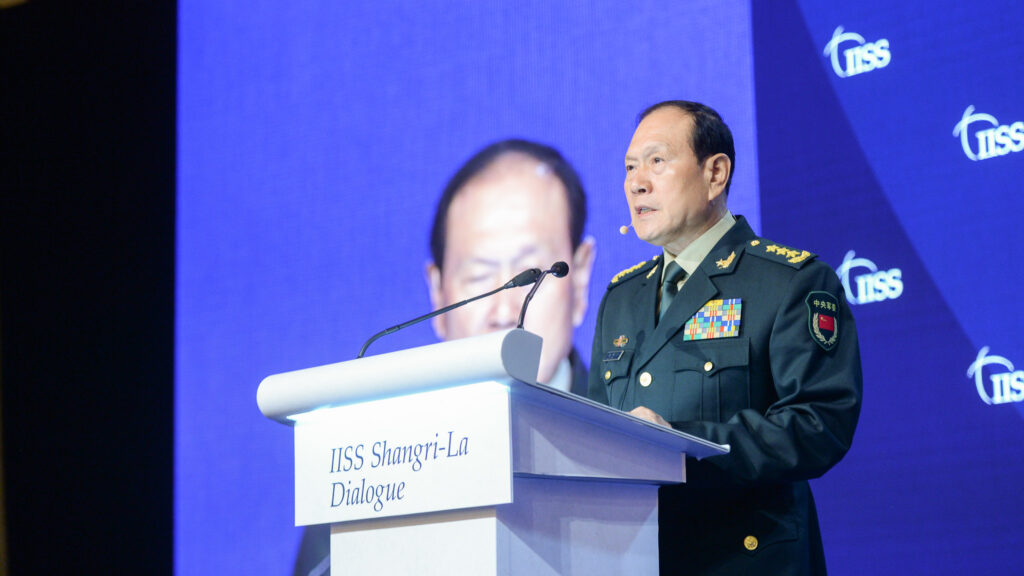COLIN CLARK

SINGAPORE: In a much anticipated keynote at the Shangri-La Dialogue, Chinese defense minister Gen. Wei Fenghe warned that China “will fight to the very end” if “anyone dares to secede” from China, a not-so-veiled shot at Taiwan.
“We will fight at all costs. And we will fight to the very end. This is the only choice for China,” Wei said. Taiwan, of course, is claimed by China as a runaway province.
But while laying down that threat, Wei also used a rare public speech to then try and paint China as an innocent player in the region, constantly at threat from an US Indo-Pacific strategy that is “an attempt to build an exclusive small group in the name of a free and open Indo-Pacific.”
Washington’s goal, he claimed, is to “to target one specific country. It is a strategy to create conflict and confrontation to contain and encircle others. China holds that for any strategy to be valuable it should adapt to the historic and global trends and contribute to regional peace, stability, and the shared interests of all. Considered we should uphold the rule of law and oppose acting on one’s own, the order of of human civilization must be based on the rule of law. Otherwise, the law of jungle will prevail.”
The Chinese official also offered the view that regional “solidarity and cooperation can keep us on the right path,” battling “hegemony.” (While Wei’s comments were made in Mandarin, a government-approved translator provided English remarks.)
“Countries, big or small, are all equal. We should respect each other and treat each other as equals and reject a zero-sum game in which the winner takes all. We should seek peaceful coexistence and win-win cooperation, rather than hegemony and power politics,” Wei said. “Politics, global affairs should be handled through consultation by all stakeholders, instead of being dictated by just one country or small group of countries. No one and no one country should impose its will on others or bully others under the guise of multilateralism.” He also argued that “China respects freedom of navigation enjoyed by all countries under international law.”
Wei’s presentation of events in the South China Sea, most of which China lays claim to, was met with expected skepticism in the audience of several hundred defense officials and observers from around the Indo-Pacific region. The idea that Beijing would never act to bully smaller countries in the region left several attendees chuckling when they discussed it afterwards. Wei’s speech, after all, ignored China’s destruction of coral reefs throughout the South China Sea to build military bases, China’s blockade of six Philippine reefs by its naval militia and navy in March last year or the standoff between Indonesian and Chinese naval ships at the Natuna Islands. He also did not mention China’s battles with Indian troops at the Line of Control in the Himalayas.
Throughout the speech, Wei returned time and again to the idea that the US is trying to force its will upon the region.
“Actually freedom of navigation is not under threat in the South China Sea,” he said. “However, some big power has long practiced navigation hegemony on the pretext of freedom of navigation. It has flexed its muscles by sending warships and warplanes on a rampage in the South China Sea as neighbors that cannot be moved away from each other. We countries in this region must stay vigilant and prevent some countries outside this region from meddling in the affairs of our region and turning the South China Sea into troubled waters.”
The United States, Australia, the United Kingdom and even Germany have performed Freedom of Navigation Operations (FONOPS), where ships are sailed through international waters as a signal that no one can claim them, in the South China over the last year. The reference to “one big power” would clearly be targeted at Washington, which has more than doubled FONOPS in the region over the last five years.
The German example is particularly striking because it was the first German military transit of the sea since 2002, and comes as China has risen to become Germany’s most important trading partner. (One German here joked that as the ship made its way through the sea it seemed to grow from an aging frigate to an aircraft carrier with each news story.)
Responding to a question at the end of his speech, Wei seemed to refer to the various European FONOPS when he said the South China Sea “issue should be resolved by countries in the region. The question is, right now, there are countries — non-regional countries — meddling with issues in the South China Sea, stirring up trouble.”
Wei later insisted that China’s vast weapons modernization is wholly defensive in nature. “China’s position is very clear. If you want to talk, we should talk with mutual respect. If you want to engage, we should seek peaceful coexistence,” he said referencing the United States. “However, if you want confrontation, we will fight to the end.”
It doesn’t seem Wei’s comments found much traction among the audience at the conference. All the questions he received after his speech were either critical or skeptical, clearly reflecting a fundamental skepticism among the audience.
One close observer of China here at Shangri-La Dialogue, the Stimson Center’s Yun Sun, said this in an email: “The perspectives are simply so different. What China believes to be righteous and rightful is seen as aggressive and threatening by others.
“Based on the questions to him, the reaction is negativity, incredulity and disbelief. The world doesn’t buy it.”
No comments:
Post a Comment